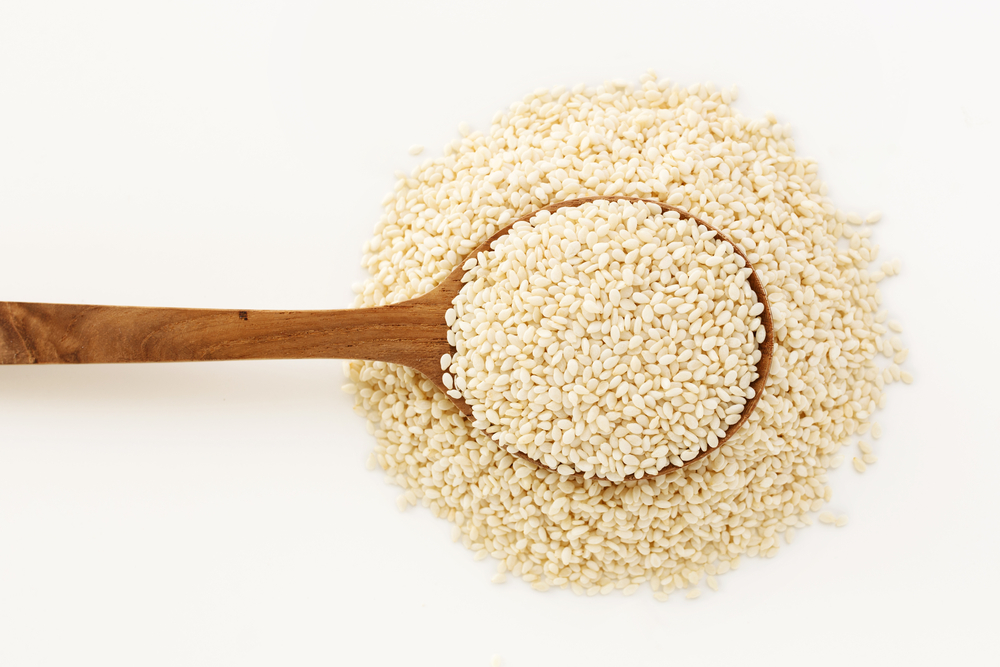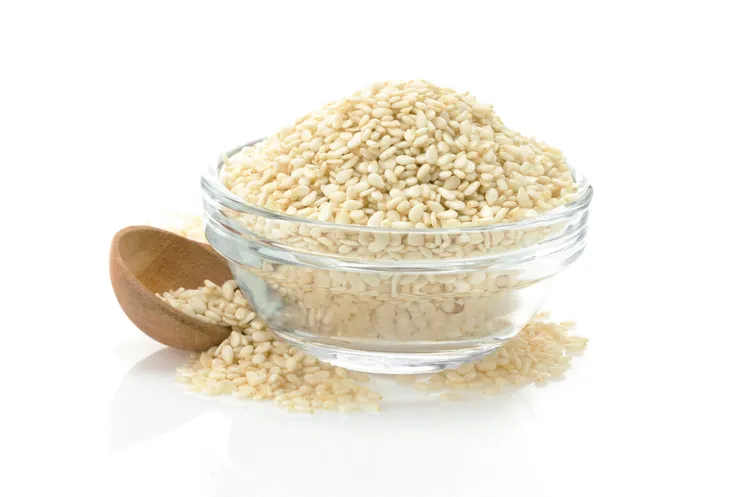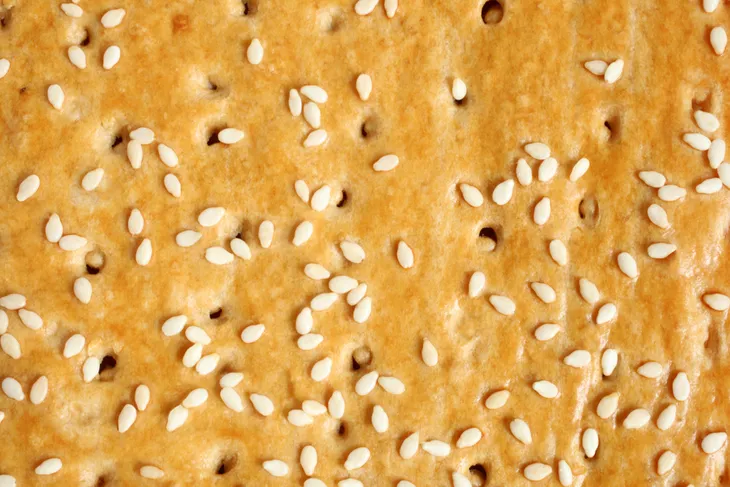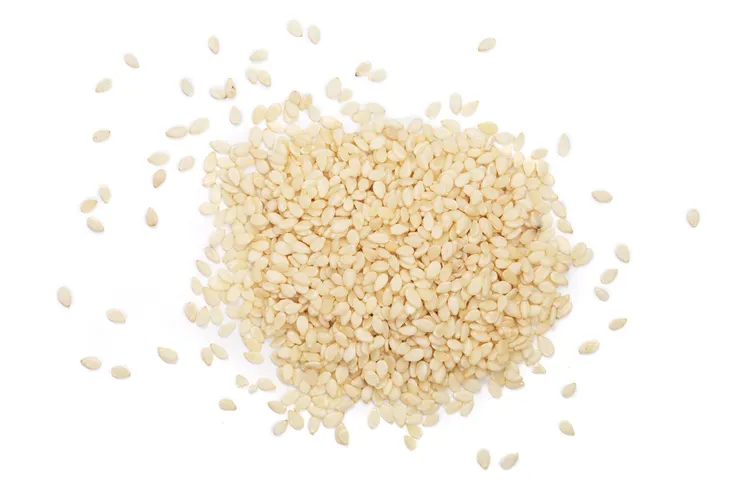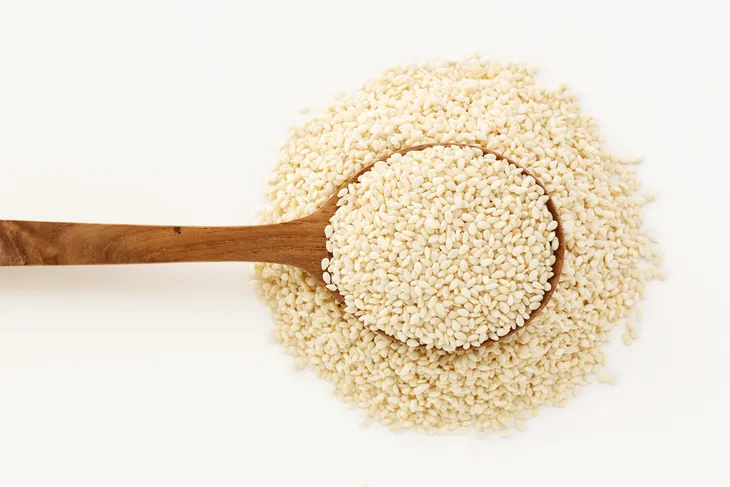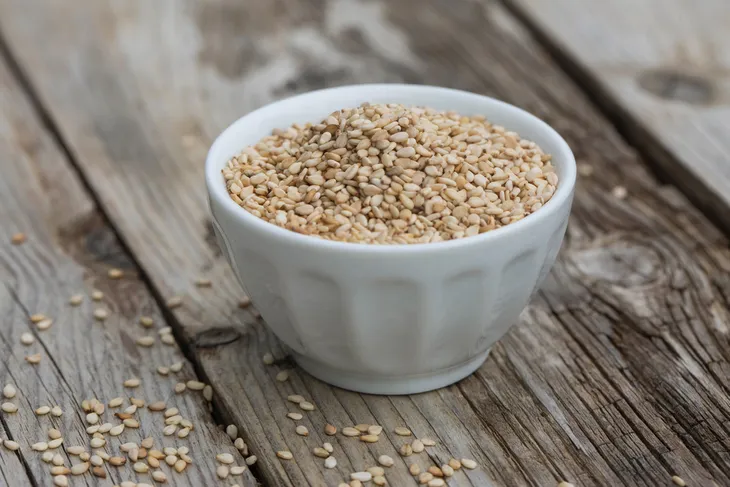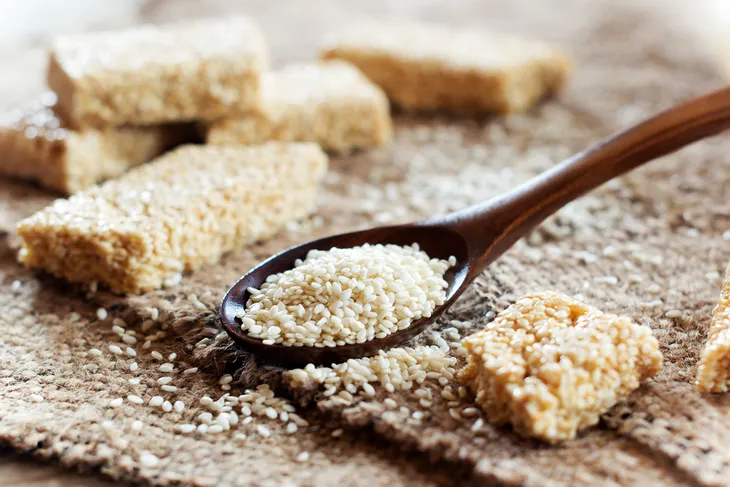There’s no doubt that sesame seeds are a tasty snack, but there’s a lot more to them than that. Despite their small size, there are a host of related health benefits that are relatively big.
From heart-helping properties to packing protein, there are many reasons to swap your sweets for seeds – sesame seeds, to be more precise. Let’s take a look at 13 health benefits of eating them on a regular basis…
Controlling Cholesterol
We’re so used to hearing about how to watch our cholesterol intake, but now you can eat a healthy snack that lowers it as you enjoy more. Dr. Axe explains there are something called phytosterols in sesame seeds, which apparently help to lower cholesterol levels.
“Phytosterols are plant sterols structurally similar to cholesterol that act in the intestine to lower cholesterol absorption,” it explains. The source adds that research involving 27-seeds and nuts, sesame seeds top the list as having the highest level of phytosterol.
Protein Punch
According to LiveStrong, sesame seeds pack a healthy dose of plant protein, although you’ll need a minimum of 6.4-grams per serving to be considered a good source (10-percent of the daily recommended intake).
However, to achieve 10-percent of your daily protein requirements from the seeds alone, you’d also be consuming a lot of calories in the process, warns the source. “The nutrient profile for these seeds makes them a good supplement to other plant proteins in vegetarian and vegan diets,” it adds.
Lowering Oxidative Stress
A site called ModernFarmer.com cites Brazilian research that shows sesame seeds can have “a remarkable effect on oxidative stress in the body.” You may now be wondering what oxidative stress is, and why this is important to you.
Oxidative stress is associated with free radicals created when your body uses oxygen, notes the source. While free radicals aren’t inherently dangerous, too many of them can cause an imbalance. It says that oxidative stress has been linked to health problems such as diabetes, cancer, and even heart failure. Sesame seeds contain antioxidants that help reduce this oxidative stress, it adds.
Diabetes Management
Yes, you should still take any medications your doctor has prescribed for diabetes, but adding sesame seeds into your daily regimen can help control your blood sugar, according to Berkeley Wellness.
The source cites a “small” study that appeared in Clinical Nutrition in 2011, involving type 2 diabetes patients given sesame oil, diabetes medication, or both. “Those in the combination group had the greatest blood sugar reductions over 60 days,” says the source, noting the researchers believe sesame oil may boost the effectiveness of the medication.
Osteoarthritis Relief
The same source cites an Iranian study that appeared in the International Journal of Rheumatic Diseases, showing people with osteoarthritis of the knee benefitted from sesame seeds.
It explains that the patients that added 1.5-ounces of powdered sesame seeds a day to their “usual treatment” for the condition – namely acetaminophen and glucosamine – reported more pain relief over 2-months than those following their usual treatment.
Happier Hearts
Since we already mentioned that these seeds can help manage cholesterol, it’s really no surprise there are benefits for your heart. Dr. Axe mentions “lignans” found in sesame seeds (and other seeds) can “normalize” cholesterol and blood pressure.
It says these lignans, which are phytonutrients, can lower serum blood and liver cholesterol levels too. It notes 50-grams of sesame seed powder taken over a 5-week period by healthy adults has shown positive effects on total cholesterol levels, as well as LDL cholesterol (the bad type that can put your heart at risk).
Taking The Pressure Off
Berkeley Wellness also stresses the blood pressure benefits, explaining “at least three studies” show that sesame seeds can help you in this area. High blood pressure rarely has symptoms, but can result in strokes and heart problems.
The source cites a small study in the Nutrition Journal that shows people with “prehypertension” – that is, those who don’t yet have high blood pressure but are at risk – significantly lowered their systolic blood pressure (by 8-points on average) by consuming black sesame meal for 4-weeks.
Helping Hormones
Dr. Axe explains there’s potential for sesame seeds to “positively affect sex hormone production” thanks to its effect on fatty-acid metabolism, especially relating to post-menopausal women.
It cites a 2009 study in the Journal of Nutrition that shows consuming sesame has positive effects on blood lipids and antioxidants, which in turn positively affects hormones in females. It says sesamin, a type of lignan, “was shown to be converted by intestinal microflora to enterolactone, a phytoestrogen compound with estrogen-like activity.”
Fighting Fat
Sesame seeds are actually pretty high in fat – in fact, one source says it contains 50-grams of fat per 100-gram serving – but Dr. Axe takes a slightly different angle. It says fats make our brains produce hormones that make us feel full longer.
It adds that healthy fats “turn on your fat-burning switch” by reducing a hormone called ghrelin, which makes you feel hungry in the first place. It notes lignans in sesame can also help boost your metabolism, and that animal studies have shown it can assist in liver function. “They can increase burning fat by improving the activity of several liver enzymes that actually work to break down fatty acids,” it adds.
Contains The ‘Good’ Fats
You might be a bit confused how sesame seeds can have such a high fat content, but still somehow be able to reduce fat. EveryDay Health explains that sesame seeds contain unsaturated fats, which “are what you should eat the most of as part of a heart-healthy diet.”
It says there are two classes of unsaturated fats – monounsaturated and polyunsaturated – and sesame seeds are among the best sources of monounsaturated fats along with pecans, pumpkin seeds, and olive oil (among others). Here are some other Top Sources of Healthy Fats.
Improves Nutrient Absorption
The good stuff you put into your body is only really useful if your body can absorb it, and apparently sesame seeds can help in this process, according to Dr. Axe. It says fatty acids are required to absorb fat-soluble nutrients including vitamin A, D, and more that are important for many functions.
“Including a source of healthy fat like sesame seeds, sesame oil or sesame butter with a nutrient-dense meal can help you actually absorb and use the nutrients,” it explains.
A Solid Source of Iron
While sesame seeds can help you absorb certain vitamins and nutrients more effectively, the seeds themselves deliver quite a buffet of nutrients as well, adds Dr. Axe. It says 2-tablespoons of whole sesame seeds contains a “substantial” amount of iron, magnesium, copper, and more. “The iron found in sesame can help prevent iron deficiency tied to anemia and low energy,” it says.
Along with these trace elements that are important to your body, you’ll also get a healthy dose of dietary fiber – about 2-grams per 2-tablespoon serving, it adds. There’s also calcium content, but there’s some debate about how useful it is from sesame seeds. (Here are some more Foods That Will Boost Your Iron).
